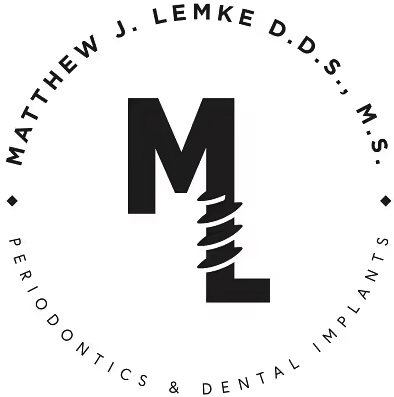WHAT TO LOOK FOR
The Most Common Symptoms of Gum Disease
Gum recession, loose teeth, bad breath and bleeding gums are all symptoms of gum disease.

Learn More About The Revolutionary No Cut, No Sew Laser Gum Surgery!
Gum Recession

Factors That Affect Gum Recession
Gum recession occurs when the gums start to pull back from the roots of your teeth.
Some causes of gum recession include:
- Periodontal Disease
- Genetics
- Tooth Brushing Routine
- Poor Dental Hygiene
- Hormonal Changes
- Tobacco Use
- Grinding or Clenching of Teeth
- Crooked Teeth or Bite Misalignment
- Body Piercing
Steps To Prevent Recession
Steps suggested to prevent gum recession include:
- Seeing your doctor for regular cleanings and checkups
- Not smoking or using other tobacco products
- Eating a healthy and well-balanced diet
- Using the proper brushing techniques with a soft-bristled toothbrush or an electric toothbrush
- Seeing your doctor to correct a misaligned bite or teeth grinding problems
Gum recession (receding gums) is a common concern for many patients. Gum recession occurs when soft tissue starts to erode and travels down the roots of the teeth.
Receding gums usually occurs over time. Some patients with gum recession may not even notice it happening until it progresses and becomes obvious. Receding gum symptoms include gaps between the teeth, tooth sensitivity, changes in the way the smile looks, and teeth that are longer than usual. Notches and dents in the tooth structure are also signs of gum recession.
Receding gums, which may indicate gum disease, will not reverse on its own. Preventing or treating gum disease today with Dr. Matia and Dr. Lemke can help prevent gum recession tomorrow.
What causes receding gums?
- Gum disease: A bacterial infection in the mouth can destroy the soft tissue and lead to loss of bone and teeth, if left untreated.
- Genetics: Some people are predisposed to developing gum recession due to gum disease, no matter how well they take care of their teeth and gums.
- Vigorous tooth brushing: Brushing the teeth too hard can damage soft tissue and contribute to receding gums.
- Poor dental hygiene: Brushing and flossing teeth regularly keeps harmful bacteria off of the teeth and gums. Failure to do so can lead to periodontal disease and receding gums.
- Hormonal fluctuations: Women who experience changes in their hormonal levels may develop tissue tenderness and gum recession.
- Tobacco use: Tobacco use can lead to a buildup of plaque on the teeth, putting gums at risk of periodontal disease and recession.
- Grinding and clenching teeth: Receding gums are sometimes caused by constant tooth clenching and grinding.
- Crooked teeth/misaligned bite: Teeth that are out of line or crooked can make the gums and jaw bone work harder, causing gum recession.
- Piercings: Mouth piercings on the tongue and lips may irritate gum tissue and cause it to recede.
Treatment for Receding Gums
Addressing gum disease: Gum disease may be to blame and can be treated to prevent receding gums from getting worse. A good cleaning, laser surgery, and antibiotics may be used to remove harmful bacteria, plaque, and calculus from the teeth and gums.
Grafting: Receding gums can be improved with a soft tissue graft using material from the patient’s own mouth or a tissue bank to elongate the gum line.
If you have gum recession, Dr. Matia and Dr. Lemke in Wooster, OH can help. Call us today for your consultation.
Loose Teeth
Loose or missing teeth often result from untreated periodontal disease, a bacterial infection in the mouth that destroys the supporting structures that teeth require to stay healthy. Other gum disease symptoms may include bad breath, bone loss in the jaw, gum recession, and other problems that Dr. James Matia can treat. Injuries, disease, and genetic factors can also lead to missing teeth.
Gum Disease Symptoms
Gum disease symptoms can vary from person to person but here are some of the most common indicators of infection.
- Sensitive, red, inflamed gums that bleed, especially when brushing or flossing
- Puss around the teeth or gum line
- Trapped food around the teeth or beneath the gums
- Gum recession (receding gums)
Gum Disease and Missing Teeth
Loose teeth or missing teeth are possible gum disease symptoms. When bacteria get trapped between the teeth and gums for lengthy periods of time, they can begin to destroy soft tissue and healthy bone in the jaw. This can jeopardize tooth support and, without treatment, teeth are likely to loosen and possibly fall out. Although these symptoms are possible, it is important to note people with gum disease do not always show symptoms.
Avoid Missing Teeth with Treatment
Brushing and flossing your teeth after meals as well as scheduling regular visits with your dental care provider is your best defense against missing teeth. Other ways to avoid missing teeth include eating foods that support good overall health. In some cases, vitamin supplements, prescribed by your doctor, can also help to control gingivitis, the early stage of gum disease.
Treating Teeth that are Already Loose
Dr. Matia and Dr. Lemke treat gum disease symptoms every day, including missing teeth. Comprehensive cleanings, laser gum surgery, antibiotic therapy, gingival and bone grafting, and dental implants are just some of the ways that loose or missing teeth can be addressed.
Do not ignore gum disease symptoms. Dr. Matia and Dr. Lemke in Wooster, OH can address loose or missing teeth. Call us today for your consultation.
Bleeding Gums
 Bleeding gums can occur for various reasons. If you have bleeding gums, Dr. James Matia is a periodontist in Wooster, OH who can determine whether or not gum disease is to blame. Bleeding gums often look red and inflamed and they may feel sore. These are common symptoms of gum disease that you do not want to ignore.
Bleeding gums can occur for various reasons. If you have bleeding gums, Dr. James Matia is a periodontist in Wooster, OH who can determine whether or not gum disease is to blame. Bleeding gums often look red and inflamed and they may feel sore. These are common symptoms of gum disease that you do not want to ignore.
Gum Disease and Bleeding Gums
Too much harmful bacteria in the mouth, often a result of poor oral hygiene, can infect and inflame the oral tissues and cause them to bleed. Bleeding gums may also be an indication of gingivitis, the first stage of gum disease, which is why visiting Dr. Matia for regular exams is important. Treating it early and practicing better oral hygiene will help to prevent the problem from getting worse. Otherwise, you could risk developing periodontitis, which is a more serious stage of gum disease that destroys bone and can lead to tooth loss. Laser gum surgery and meticulous homecare can help to manage periodontitis.
Medication and Bleeding Gums
If you have bleeding gums and take medication, be sure to tell our doctor. Sometimes medicine can make the blood thinner and cause bleeding gums, especially blood thinning prescription medications, NSAIDs (non-steroidal anti-inflammatory drugs), blood pressure medications, birth control pills, and even over the counter medications like aspirin.
Pregnancy and Bleeding Gums
Women who become pregnant may experience bleeding gums due to an increase in hormone levels, which can make gum tissues more tender and prone to bleeding. Gingivitis is also common among pregnant women, making good oral hygiene even more important so that it does not get worse. Research shows that women with periodontal disease who are pregnant are more likely to deliver prematurely and have low birth weight babies.
Do not ignore bleeding gums. Dr. Matia and Dr. Lemke are leading periodontists in Wooster, OH who can help determine the cause and suggest proper treatment. Call us today for your consultation.
Bad Breath
People who have gum disease symptoms often complain about having bad breath, or halitosis. While bad breath is one of the many gum disease symptoms that our doctor treats every day, it can also be a symptom of something else.
Flossing and brushing at least twice a day, using a tongue scraper, and visiting our doctor regularly for exams and cleanings will help to prevent bad breath. Otherwise, offensive smelling bacteria can get trapped between the teeth and gums and on the tongue, which can lead to gum disease.
If you do have persistent bad breath, gum disease may be to blame. A buildup of plaque and bacteria on the teeth can release toxins, infect gum tissues, and cause an unpleasant odor in the mouth. Laser gum surgery in the Wooster, OH area with Dr. Matia and Dr. Lemke can address this condition. If left untreated, gum disease symptoms can become worse and lead to tooth and bone loss.
Other bad breath culprits
Strong foods, such as cheese, garlic, onions, and spices are also common causes of temporary bad breath. Mints, gums, mouthwash, brushing, and flossing can help to mask the odor to some degree, but it will not go away completely until the food has fully metabolized.
Smoking and chewing tobacco also causes a foul breath smell and is unhealthy for the rest of the body. Tobacco products can irritate the gums and prevent the taste buds from functioning as well as they should.
Dry mouth, yeast infections in the mouth, cavities, diabetes, digestive disorders such as acid reflux, respiratory infections, liver and kidney disease, and sinus problems can also make the breath smell bad.
To combat bad breath, take care of your teeth and gums with good oral hygiene and dental checkups. Do not smoke, drink plenty of water, and consider monitoring what you are eating each day to determine if food is to blame. A visit with your physician may also be helpful.
Remember, gum disease symptoms should never be ignored, including bad breath. If you have bad breath, a visit with Dr. Matia and Dr. Lemke can determine if you are experiencing gum disease symptoms. If so, gentle laser gum surgery in the Wooster, OH region can help to treat this condition. Call us today for your consultation.
